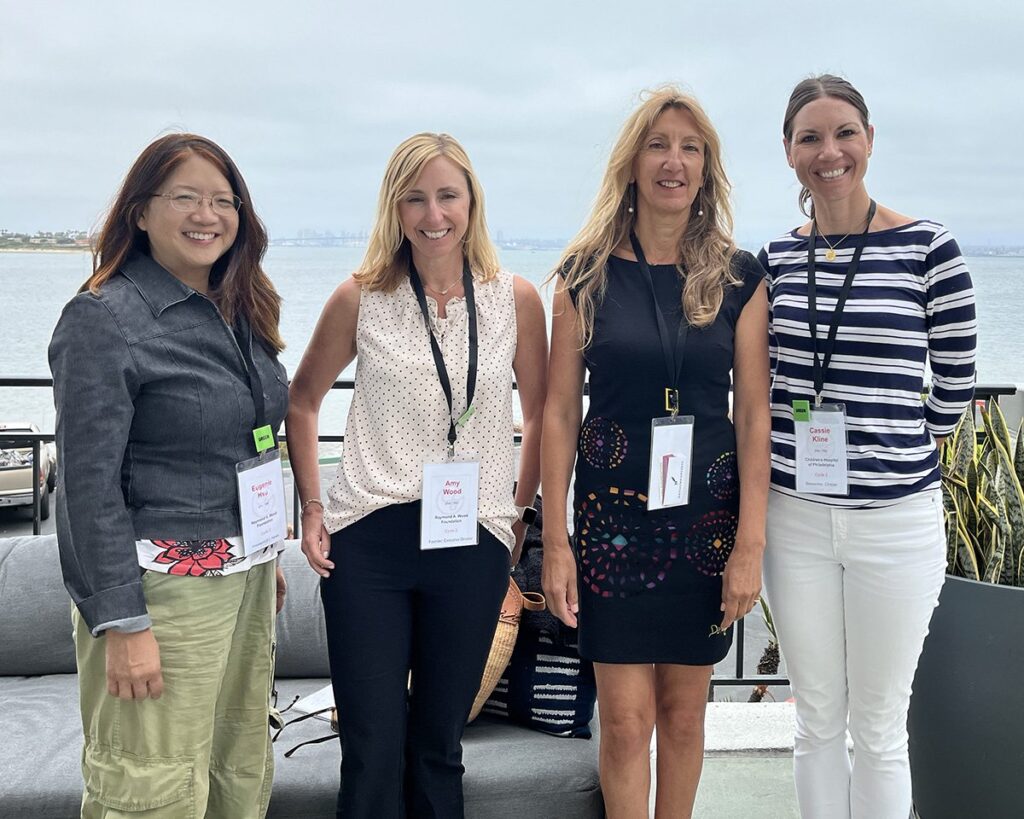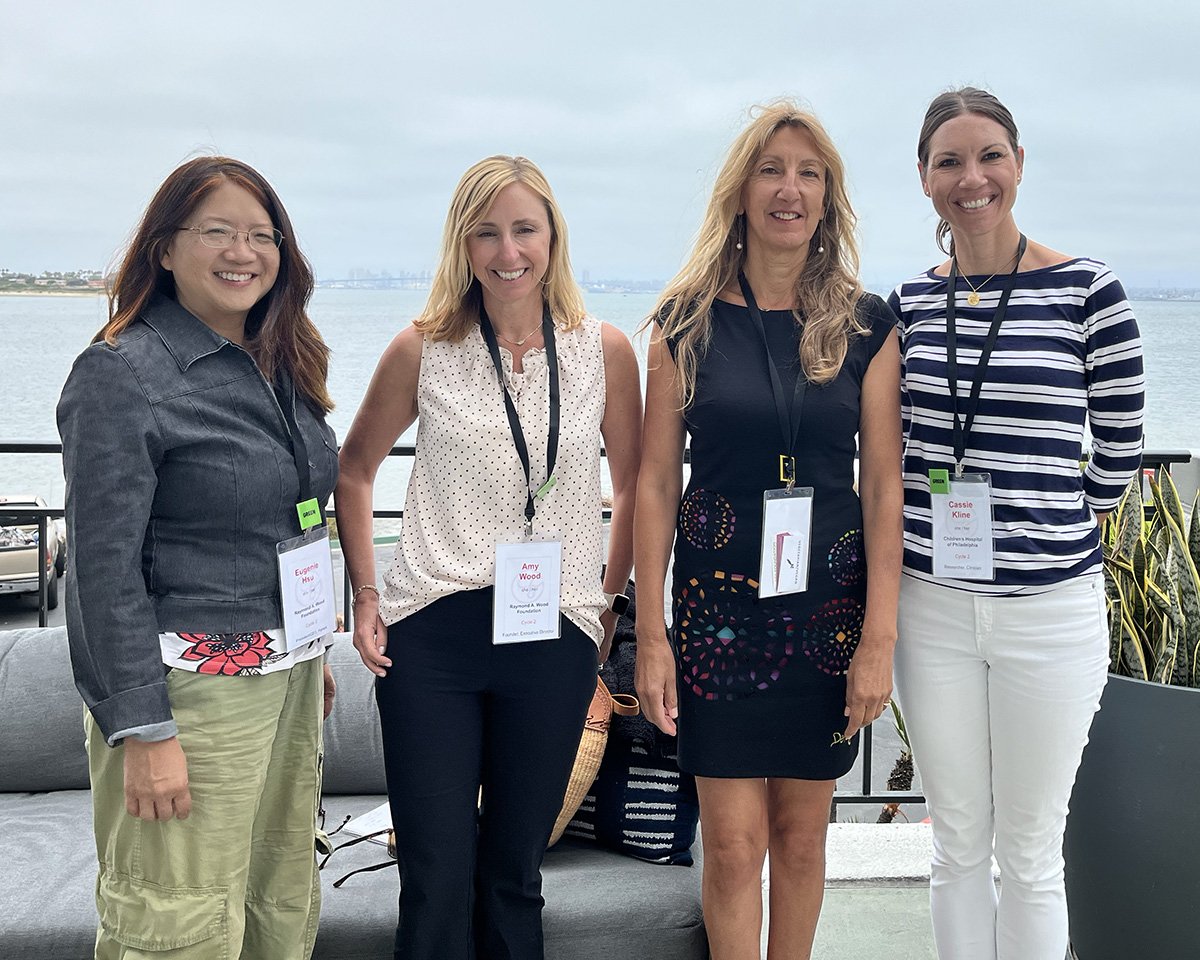The Raymond A. Wood Foundation Joins Fellow Rare As One Network Organizations in a Convening Hosted by Chan Zuckerberg Initiative
Grantees of the Chan Zuckerberg Initiative (CZI) Rare As One (RAO) Network convened this past week in San Diego, California for three days of training on advancing research in their respective diseases.
Delegation to CZI Rare As One Convening (from Left to Right), Eugenie Hsu, Ph.D, board chair; Amy Wood, executive director; Nathalie Kayadjanian, Ph.D, scientific advisor; and Cassie Kline, MD, neurooncologist, CHOP
Raymond A. Wood Foundation (RAWF) was named a Cycle 2 grantee in late 2021 and has been leveraging the financial and support resources provided to build the foundation’s capacity to support research on craniopharyngioma and it’s long term outcomes. The RAWF contingency for the convening included Amy Wood, executive director; Eugenie Hsu, Ph.D, board chair; Nathalie Kayadjanian, Ph.D, scientific advisor; and Cassie Kline, MD, neurooncologist, Children’s Hospital of Philadelphia and member of RAWF’s scientific advisory board.
The goal of the convening was to enable organizations to advance and share approaches to patient-driven research, to identify scientific and other synergies between diseases, and to strengthen and build connections between the grantees, researchers, and others in the broader rare disease community.
The challenges faced in rare disease research
The Orphan Drug Act defines a rare disease as a disease or condition that affects less than 200,000 people in the United States. According to the Food and Drug Administration (FDA), over 7,000 rare diseases affect more than 30 million people in the United States. Many patients go undiagnosed and the vast majority of rare diseases exist without FDA-approved treatments so patients suffer with a poor quality-of-life and/or die untimely deaths.
Patient advocacy organizations, many founded by parents, spouses, siblings and/or survivors are keenly focused on advancing research around their respective diseases to improve time to diagnosis, support development of treatments and improve quality of life.
“Action is Therapy”
“Action is therapy,” said Debra Miller of Cure Duchenne in her presentation on patient driven research where she shared the organization’s model of seed funding potential therapies and the importance of demonstrating scientific expertise.
And our organizations are taking action, despite the immense challenges and roadblocks that arise in navigating this complex system of medical research. The Rare As One network is a community committed to roll up their sleeves and put in the hard work to make steps towards a better future.
Session topics included patient focused research, addressing diversity challenges in patient-driven research, data sharing to advance diagnosis and future research, identifying diagnostic approaches, challenges and solutions and identifying disease synergies.
“Research in any one disease lifts all boats”
“Research in any one disease lifts all boats,” stated Gregorio Millett, Vice President and Director of Public Policy for amfAR, the Foundation for AIDS research. Millett spoke of the importance of curated existing data and distilling it in a way that is available and applicable.
Emphasis was placed on the value of the patient voice in driving research and moving the needle in each respective disease to improve time to diagnosis, developing novel treatments or finding opportunities for drug repurposing.
Organizations shared their initiatives to facilitate research which demonstrated commonalities among approaches including designing and building patient registries and natural history registries, mobilizing patient communities, investing in experiments that are replicable to speed up timelines for drug development and building trust among underserved patient communities.
Sharing a highlight of our research work
AmY wood presents research findings on diabetes insipidus
A poster showcase took place during this event demonstrating the work of patient organizations toward advancing patient-driven research. RAWF shared a research effort that supports our ongoing work in development of a home-use sodium meter to improve management of care of patients with adipsic diabetes insipidus.
The poster outlined a market research project conducted by the Penn Biotech Group commissioned by RAWF to analyze data around incidence and prevalence of diabetes insipidus, cost of care and percentage of hospital admissions while also identifying secondary conditions that could benefit from at-home sodium testing. A portion of the data captured was from Komodo’s Prism Database which has been provide to RAO grantees by CZI.
Convening key takeaways
Presenters highlighted both the successes achieved by organizations in advancing research but also shared the struggles they encountered along the way. There was an emphasis on the importantance of the patient’s voice in advancing research, using technology to bridge gaps and reach patients globally, representing diverse patients in research and creating efficiencies that can improve the length of time it takes to advance research.
“It’s inspiring and humbling!”
“I am seeing individuals and groups in rare disease do what seems impossible: reorganizing the research ecosystem, going from being a disease activist protesting outside the White House to being a disease advocate working in the White House, forming alliances across international borders and cultural/language barriers with their disease communities, going from small event fundraising to raising millions of dollars with large donors, starting their own labs to research their rare diseases with cutting-edge science and technology and searching the world for a diagnosis for their elusive rare diseases,” said Eugenie Hsu. “It’s inspiring and humbling!”
So, what’s next?
Over the coming months under the guidance of Nathalie Kayadjanian, RAWF’s scientific advisor and supported by the funding from the Rare As One grant, the Raymond A. Wood Foundation is gathering input from key opinion leaders, leading craniopharyngioma researchers, members of our scientific advisory board and patient representatives to develop a strategic research plan to prioritize research initiatives with the goal to expand collaboration to improve tumor treatment approaches, develop resources to guide treatment decisions in an effort to reduce burden on patient or caregiver, and to attenuate the most treatment elusive conditions that result from these tumors and treatments including hypothalamic obesity, adipsic diabetes insipidus, cognitive impairments and psychosocial implications.
“There’s no one in the world who is more motivated to find solutions for rare diseases than the patients themselves and those who love them,” said Hsu. “We, at the Raymond A. Wood Foundation (RAWF), aim to do that for our hypothalamic-pituitary brain tumor survivors.”
How can you be a part of advancing research around craniopharyngioma and hypothalamic brain tumors?
Be a part of our collective voice of the patient. Become a member of the Raymond A. Wood Foundation to participate in our advocacy efforts and inform our work.
Participate in surveys to help us gather data to share with the research community.
Spread the word about our work with your network by sharing our social media posts and commenting on how our work affects you or your loved one.
Share your story. We are collecting videos of patient stories, to share yours, email outreach@rawoodfoundation.org.
Start a peer-to-peer fundraiser or sign up for a monthly donation of any size to help us raise the necessary funds to advance research and provide services and support to this community.



